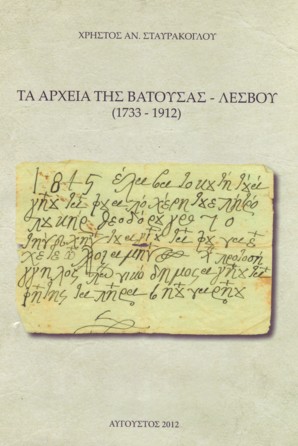 |
|
|
Book release for The Archives of Vatoussa: 1733-1912 written by Christos Stavrakoglou |
|
 |
Title: The Archives of Vatoussa [Lesvos]: 1733-1912 Author: Christos An. Stavrakoglou Publisher: Christos and Mary Papoutsy Foundation for the Revitalization of Vatoussa Printer and Graphics: D. Doukas and Sons, Mytilene Date of Publication: 2012 Language: Greek (with a foreward translated into English) ISBN: 978-960-93-4345-9 Description: Hardcover, 654pp, index, images Availability: (Greece) Lesvosbooks.gr; (U.S.) Enfield Publishing and Distribution Co. at http://www.enfieldbooks.com |
About the Book (by HCS Publisher Mary Papoutsy, one of the sponsors of the book) This recently released, 654-page masterpiece, printed in Greek (with English translation of forward), offers a significance new resource on rural island history in the eighteenth and nineteenth centuries. It is the culmination of a decade of research and transcription of hand-written documents by one of the island’s most respected and well-known independent scholars, Christos Stavrakoglou. And Vatoussa, a traditional, historic village located in the northwestern foothills of Lesvos, provided the materials and dramatic setting for this rare glimpse into the past. The information contained in this volume offers an unprecedented insight into the daily activities of a number of generations of islanders. Their experiences come alive in the transcriptions of actual documents unearthed in the village where readers can trace their struggles. Dowries, wills, proceedings of the dimogerontes, financial transactions of the local Church—which acted as an informal bank during the Ottoman occupation—all appear in great detail. Stavrakoglou has triumphed in presenting a work on the entire village, based on a near two-hundred-year span of primary-source records. Not only will scholars find much of value in this seminal tome, but Vatoussans and other Lesviots will benefit from the invaluable genealogical data, especially the lengthy index of individuals in the appendix. This publication is a rare appearance in Greece of such a complete view of island life in the late Ottoman period. Living conditions, local regulations, and socio-economic vitality of Vatoussa appear with clarity. Village correspondences, too, with Vatoussan enclaves in Smyrna and Constantinople, as well as with Metropoleis and the Patriarchate, have also been among the treasures discovered by Stavrakoglou, detailing the relationship of the village as a whole with other towns and institutions. The Archives of Vatoussa has already been cited as a resource internationally for Post-Byzantine Law, with specific reference to ecclesiastical decisions on issues of marriage, prenuptial agreements, aphorisms, donations, sales and rentals of properties, inheritances, payments and distributions, loans, proxies, leases, and other legal categories. Reviewers at LesvosBooks.gr have highlighted sociological aspects of the book, specifically mentioning social problems and the villagers’ efforts at redress. One Mytilinian author and critic, Aris Kyriatzis, praised the efforts of Stavrakoglou to present and annotate the original documents, expressing “admiration for the rich material” and describing it as a “great, valid, valuable” magnum opus “of prominent philologist Christos Stavrakoglou.” Island journalists likewise were laudatory in their assessments, as evidenced by the website of the island’s largest newspaper, Dimokratis: ‚rguably, it is a perfect resource for historians and students of history.” And finally, Vatoussans themselves have embraced the memorialization of their village, freely expressing their admiration and appreciation after a recent successful presentation of the book at the Cultural Center of the Municipality of Athens. Xenia Vazirgiantziki wrote on Facebook:
Stavrakoglou has done a masterful job in presenting the original records. His choice to transcribe all of the hand-written documents is sound, as is his decision to select a representative sampling for reproduction on pages 475-529. Even for those Western scholars with a reading knowledge of Modern Greek, the task of translating these records would prove Sisyphian, given the range of penmanship and writing styles in vintage Katharevousa, as well as anomalies of Mytilinian dialect. A laborious decoding of the fine, sometimes blurred handwriting was a task at which only a native scholar could hope to succeed. |
|
| Reviewers' Remarks Aris Kyriatzis, a noted scholar, complimented Stavrakoglou on his important work in an online article posted to Empros.net in September 2013 expressing “admiration for the rich material” and describing it as a “great, valid, valuable” magnum opus “of prominent philologist Christos Stavrakoglou.” An online reviewer for Dimokratis in Mytilini rendered a glowing assessment of the work in December 2012: “Arguably, it is a perfect resource for historians and students of history.” Reviewers at LesvosBooks.gr have highlighted sociological aspects of the book, specifically mentioning social problems and the villagers’ efforts at redress. |
|
| Book Presentations and Other Events August 2013--Vatoussa, Lesvos, Greece February 2014--Kalloni, Lesvos, Greece April 2014--Municipality of Athens, Greece August 2014--Presentation of book to Modern Greek Collection of Harvard College Libraries, Massachusetts |
|
| About the Author Christos Stavrakoglou is a philologist, a graduate of the University of Athens, and the former headmaster of the public high school in Kalloni, Lesvos. Among his many scholarly publications, a number of which appear in prefectural and local publications in Lesvos, Mr. Stavrakoglou is the President of the Christos and Mary Papoutsy Vatoussa Revitalization Foundation. Mr. Stavrakoglou has authored a number of seminal and interesting articles, especially on Greek history and foreign travel, a few of which HCS is pleased to be able to offer readers: "At Mount Athos, in Panayia's Garden [in Greek]," "One More Document From the Elders of Vatoussa," "Impressions From Australia," "In Commemoration of Asia Minor," "A Tribute to Helen Demos Papoutsy," "A Local Law of Old Achyrona (Kalloni, Lesvos, Greece)," "A Trip to Faraway Pontus: Pilgrimage to Panagia Soumela Monastery," and "Pioneer Decisions. The Abolition of Dowry Contracts at Vatoussa in 1900 [in Greek]." |
|
|
(Posting date 04 September 2014) HCS readers may wish to read releases or announcements of other books in our Books section or in our extensive, permanent archives at the URL http://www.helleniccomserve.com/archivebookreviewsandreleases.html. |
|
|
|
|
2000 © Hellenic Communication Service, L.L.C. All Rights Reserved.
http://www.HellenicComServe.com |
|
